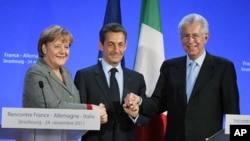French and German leaders met with Italy's new prime minister Thursday, promising to change EU treaties to allow for closer financial integration. They hope such changes will prevent future economic problems like the current eurozone debt crisis.
French President Nicolas Sarkozy, German Chancellor Angela Merkel and Italian Prime Minister Mario Monti all said they would work to stabilize Europe's economy and support the common euro currency. They gathered in Strasbourg, France,
Italy is the latest of the 17 nations using the euro to face economic problems stemming largely from huge government debts. Monti told his counterparts that Italian political parties would work together to balance the country's budget in 2013. Monti replaced Prime Minister Silvio Berlusconi earlier this month.
Germany, France and Italy are the three largest economies in the eurozone. French officials have proposed allowing the European Central Bank to act as a lender of last resort for troubled eurozone economies, and called for borrowing through the sale of common eurozone bonds, rather than those issued by each individual country. Merkel has opposed both ideas - which would require more German support for the continent's weaker economies.
One of those economies, Portugal, saw its credit rating downgraded by Fitch on Thursday. The global ratings agency says Portugal's large fiscal imbalances, large debt and adverse macroeconomic outlook mean its debt is no longer investment grade.
Investors are growing more worried about even the strongest European economy. On Wednesday, an auction of German 10-year bonds failed to find buyers for more than $2 billion of the $6 billion in bonds offered with 2 percent interest rates.
Some information for this report was provided by AP, AFP and Reuters.




